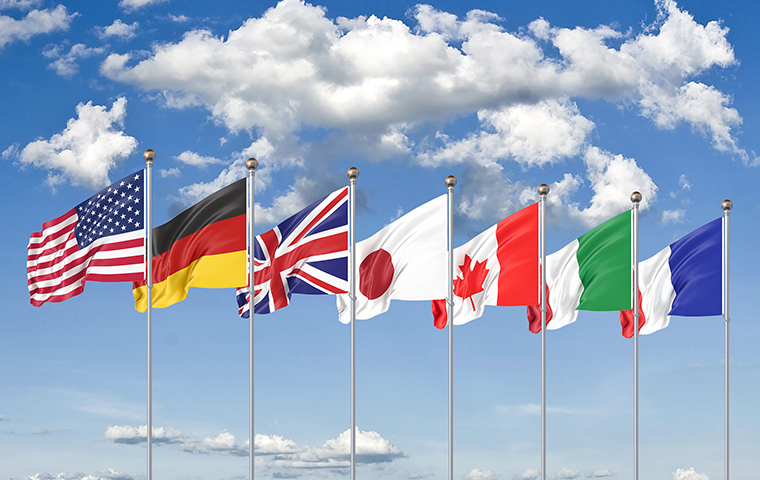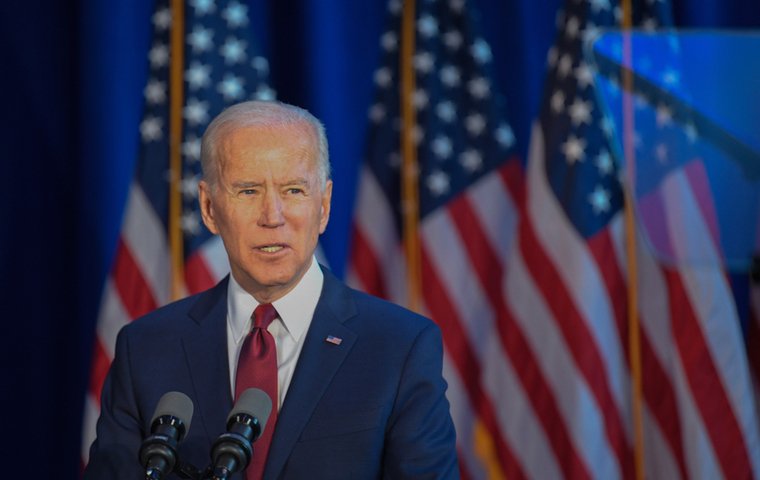Towards the Indo-Pacific Century (#1)
Related Articles

“Union” Break-up?
The year 2021 dawned with anxiety and uncertainties. We can list several reasons for the source of anxiety—political despair, COVID-induced restrictions on freedom, and the economic disparities and difficulties linked to them. These anxieties and uncertainties are having an immense and irreversible influence on the world of politics. Then, how will they transform global politics?
The political confusion that occurred from fall 2020 to early 2021 in the U.S., the world’s largest superpower which reigned as the center of global politics in the twentieth century, has sent ripples across the world. And this confusion emerged from the extraordinary leader President Trump, and the chaos after the voting in which Trump ran for re-election as the sitting president.
On January 6, 2021, President Trump was making a speech at a meeting held near the White House. For the result of the presidential election held on November 3, 2020, former Vice President Joe Biden from the Democratic Party was announced as the winner. But President Trump, still in office, shouted there were frauds in the counting of the ballots, and without showing any evidence, was claiming he was the true winner. Seeing the votes could not be reversed, many Republican lawmakers, as well as Vice President Mike Pence, were already expected to accept Biden’s victory. However, some Trump supporters who refused to accept the election result headed to the U.S. Capitol, and barged into the building, causing harrowing chaos, killing five people. If a peaceful transition of power is a crucial basis for democracy, it has wavered in American politics.
In the U.S., both political and economic rifts among the people are exacerbating. The supporters of the Democratic candidate Biden and the supporters of Republican President Trump seem to live in separate universes. The unity of the American “union” is wavering.
The U.S. is not the only one with the risk of a “union” break-up. With the transition period over, the U.K. has left the EU entirely on January 1, 2021, and the “union” as the United Kingdom is wavering. Because Prime Minister Boris Johnson rushed to agree with the EU in a short negotiation period, he complicated the problem with a hasty and incomplete agreement on the Northern Ireland issue. Also, his stance of not respecting the intentions of Scotland where the majority wished to remain within the EU generated a momentum for Scotland to head towards independence. Already, there are many reports of economic hardships and chaos from the complicated customs procedure caused by Brexit. If Brexit hardliner Johnson could not improve the economic damage from the transition, the “union” of the United Kingdom’s four nations may disintegrate, breaking up into separate sovereign states.
There is another “union” facing a challenge: the European Union. Brexit was the first case of a member demanding and attaining to leave the EU. Meanwhile, Hungary and other members in Central and Eastern Europe are drifting towards authoritarianism, and the ideal of the EU is fading. In its initial response to the COVID pandemic, the EU failed to provide appropriate policies. Now, it is under heavy criticism for the vaccine distribution. Since its establishment on November 1, 1993, the EU has never lost so much unifying power. The “ever closer union” is now facing an unprecedented crisis, with a member state withdrawing and unparalleled economic difficulties from the pandemic.
Thus, the three “unions,” the U.S., the U.K., and the EU, are currently facing a shake-up in their unities. This could lead to a larger international crisis since it was the three forces of the U.S., the U.K., and the Western European countries that formed and defended the liberal international order after World War II. It was also the U.S. and the U.K. that presented the liberal international norms as the “Atlantic Charter,” 80 years ago in August 1941. If that foundation is now falling apart, the influence would extend beyond national borders, with an immense impact on global politics—the so-called decline of the liberal international order.*1
Faced with the two unexpected political realities, Brexit and President Trump, Oxford University Professor Timothy Garton Ash, a British historian who has consistently upheld the liberal ideal, shows the possibility that a conjunction of the two could lead to “the end of the Anglo-Saxon west.”
“The nineteenth century belonged to Britain, the twentieth century (at least post-1945) to the United States. The neoliberalism which exercised a kind of global ideological dominance between the end of the Soviet Union in 1991 and the financial crisis of 2008 was a characteristic Anglo-Saxon product. It is itself the root cause of the genuine, widespread discontents which populists have exploited to gain power in both Britain and the United States.”*2
From Spanish Flu to COVID-19

In this way, 2021 will be remembered as a year the “unions” of the U.S., the U.K., and the EU were shaken. We are also entering an era where authoritarianism is gaining force amidst the rise of China and the COVID outbreak, and people are discussing the decline of the liberal international order.
That is not all. After a year-long pandemic with people confined to their homes, various events postponed or canceled, and the economic difficulties they bring, anxieties and uncertainties are ballooning evermore. The Bulgarian political scientist Ivan Krastev argues pandemics spread fear in societies, and pandemics can bring out the best from the people but could bring out the worst from the government.*3 Sure enough, some governments have used the pandemic as an excuse to postpone elections, strengthen surveillance on its people, and restrict people’s entitled rights. Krastev also explains the anxieties brought on by the pandemic, stating that if there are no angry crowds who can freely express discontent and demands on the streets of Western capitals, it would be hard to distinguish liberal democracy from its malignant imitation.*4
With the rise of populism in the U.K. and the U.S. with neoliberalism as a remote cause, combined with the social disorder from the pandemic, the structure of global order is about to be reorganized. As a result of the social restrictions caused by the pandemic, is our liberal democracy destined to be seriously damaged? In which direction is the world headed? If we cannot foresee the future, we can only look at the past. The intellectual attempt to situate the modern time within history has the effect of relativizing the present.
A year ago, on March 17, 2020, when COVID-19 seemed to engulf the whole earth, the New York Times columnist Thomas Friedman stressed the meaning of the pandemic-stricken year 2020, as a new mark in world history. He contrasted the world B.C.—Before Corona—and the world A.C.—After Corona, showing the beginning of a new world history.*5 Many intellectuals are saying this pandemic will be a watershed in global history. Would the pandemic bring us a new era? Are we shifting from the century dominated by the liberal democratic ideology to a century where surveillance and restrictions by authoritarian regimes will be the norm?
Within this brief article, I cannot draw a conclusion for such questions. But maybe I could look back to the past and conjure some landmarks in world history and relate them to provide new perspectives. Interestingly, exactly 100 years from now in 1920, people sensed the arrival of a new age. It was the dawn of a new era after World War I, when a bright future and stable peace were to come.*6
As the outcome of the previous year’s Paris Peace Conference, postwar proceedings, although incomplete, had been attained. On January 10, 1920, the epoch-making international organization, the League of Nations, was established as the foundation for future peace. Perhaps, inspired by the dawn of the new era, Japan’s Crown Prince Hirohito, the future Emperor Showa, began to prepare for setting out on his six-month tour of Europe which actually started on March 3, 1921. Concerned about the safety of the future emperor, President of the Togu Crown Prince Academy Admiral Heihachiro Togo and many others in Japan opposed the visit. Yet, it was realized with the strong support from the genros Saionji Kinmochi and Matsukata Masayoshi, and Prime Minister Takashi Hara. They must have wanted the crown prince to breathe the fresh air of the new era.
Around this time, besides the end of a world war, there was another important, yet hardly recorded landmark in world history. After sweeping the world for two years, the Spanish flu was over. With the number of deaths two to three times that from World War I, this deadly virus left piles of bodies across the world, inflicted considerable sacrifice, then receded as people developed herd immunity.
Compared to European countries, the number of cases in Japan was relatively low with few death tolls. The government encouraged wearing of masks in public spaces and frequent hand washing, with posters put up in many places such as schools and on trains. As these practices were established in elementary schools, workplaces, and other areas where people gathered, the spread of infection was successfully controlled to some extent. After the Sino-Japanese War, as Japanese military personnel expanded into Taiwan, Korea, and even mainland China, the Health Bureau of the Home Ministry worked to improve public health and took thorough measures to prevent the infectious diseases from spreading in Japan.
Continues in #2
This is a translation of the Japanese article published in vol. 94 (May 2021) of the Asteion magazine.
[Notes]
*1 The feature titled “Is It the End of the Liberal International Order?” in Asteion vol. 88 (2018) included several discussions on this theme. It shows this issue can be discussed in different ways, depending on which country to base the discussion, or which perspective, such as realism or liberalism to take.
*2 Timothy Garton Ash, “After Trump and Brexit, is this the end for the Anglo-Saxon west?” The Guardian, July 28, 2017.
*3 Ivan Krastev, Is It Tomorrow, Yet?: How the Pandemic Changes Europe, translated by Fumi Yamada, Chuokoron-Shinsha, 2020, 58.
*4 Ivan Krastev, 74-75
*5 Thomas Friedman, “Our New Historical Divide: B.C. and A.C.-World Before Corona and the World After,” The New York Times, March 17, 2020.
*6 In the special issue commemorating the 100th anniversary of the end of World War I, Kyoto University Professor Hiroshi Nakanishi expresses the dawn of this new age as “liberation for hope or fall to fear,” likening it to a poem by Yeats. Hiroshi Nakanishi, “The Second Coming, or the Age of the Lost Possibilities,” Asteion vol. 80, 2014, 34.
Yuichi Hosoya earned a Ph.D. in international politics from Keio University. He is the Research Director at the Asia-Pacific Initiative (API). His specialties are international politics and diplomatic history. After serving as a lecturer at Hokkaido University and Keiai University, he is currently a professor of international politics at Keio University. He is the author of many books, including Sengo kokusai chitsujyo to igirisu gaiko (“Post-war International Order and British Diplomacy,” in Japanese, from Sobunsha, winner of Suntory Prize for Social Sciences and Humanities), Rinriteki na senso (“Ethical War,” in Japanese, from Keio University Press), Sengoshi no kaiho (I & II) (“Liberation of Post-war History,” in Japanese, from Shinchosha), Atarashii chiseigaku (author and editor, “New Geopolitics,” in Japanese, from Toyo Keizai).




